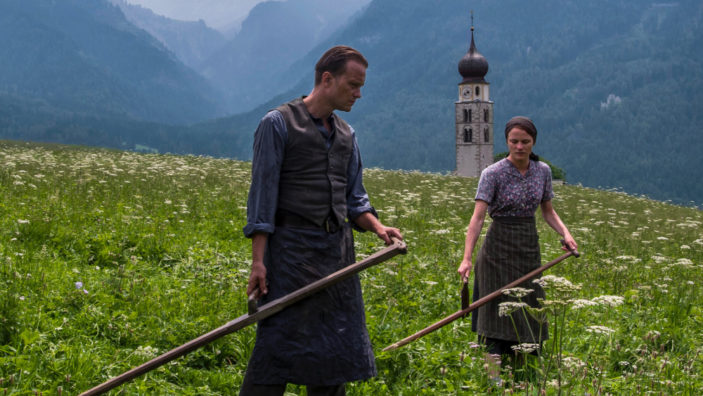
Terrence Malick and his mystical signature can be off-putting to some; many, in fact. And that’s completely understandable. The auteur has long been considered a divisive director, but it’d be foolish to deny the unconventional and dreamlike wonder he brings to poignant stories both intimate and large in scale.
Although, if you’re not already sold on Malick’s unique and unmistakable style, A Hidden Life won’t do much to convert you.
The film, brilliantly conceived and uncompromising, could have easily been captured with gritty realism, but Malick’s particulars take it into an entirely different state as he tracks the true story of an Austrian conscientious objector who was executed for his anti-Nazi stance during the second world war.
Franz Jägerstatter (played here with stoicism and conviction by August Diehl) returns from the his first conscription with a clear and explicit distaste for Nazism, preferring complete disinvolvement from the Third Reich and refusing to support the cause. He’d rather live in peace in a quiet and modest farming village surrounded by the majestic Austrian countryside, with his wife Franziska (Valerie Pachner) and children.
His fellow villagers don’t like Jägerstatter’s open rebellion at all, hence positioning the family as social pariahs. Malick and cinematographer Jörg Widmer spend the film’s first hour exploring this insidious and unfair dynamic, and the setting gives them plenty of raw natural beauty to contrast with the brewing conflict resting at the foothills. Malick is in his element in the Austrian countryside, taking in the surrounds with all the visually stunning, poignant cutaways he can possibly indulge in.
And when it comes to scenes of intimacy, conversational warmth and convention is abstracted by sporadic editing and vast, blank spaces that make even the most mundane scene turn into evocative implications. Although it’s the way Malick captures beautiful, isolated moments between Franz and Franziska that remains the heart of this first third of the story, creating a well of empathy that deepens and saddens the film’s second hour, which imprisons Franz while his wife and children are constantly abused by their neighbours.
Splitting the village’s bucolic wonder with the hopelessness of prison life successfully takes the film into a completely new territory, but the constantly evolving and kinetic cinematography always has the same effect. Close ups which truly explore each actor’s emotions are at their most valuable in this second play, giving A Hidden Life a sense of elegance and choreography that, I’d argue, we haven’t seen from Malick since Tree of Life
Franz is beaten in an attempt to get him to sign a loyalty oath to Hitler. Franziska and her children are emotionally abused back home. Aligned with why Malick chose this particular story, neither compromise on their beliefs, with the husband resolute despite knowing the damage done to his reputation and his family, while the wife is unwavering in her support and understanding of what both feel needs to be done.
It’s a quiet and often overlooked act of defiance which shows the spiritual toll of war and, in a way, vindicates those who are steadfast in the face of evil. The fact that neither break despite immense pressure is inspiring itself, complemented beautifully by a quote that contextualises the film before the final credits roll.
While the film’s largely experimental, sublime way of editing and abbreviating smaller moments to give them deeper resonance is welcome, perhaps A Hidden Life could have done with less indulgence and a tighter format. Malick’s free-form approach works well at times, but at exactly three hours, it feels as if this story could have been shaved without issue. Patience is required, of course, but Malick sometimes treads the fine line between artful storytelling and overindulgence. Although if you weren’t expecting that, then you’ve never seen a Terrence Malick film.
![]()
![]()
![]()
![]()
![]()
FOUR AND A HALF STARS (OUT OF FIVE)
A Hidden Life is out in cinemas now
